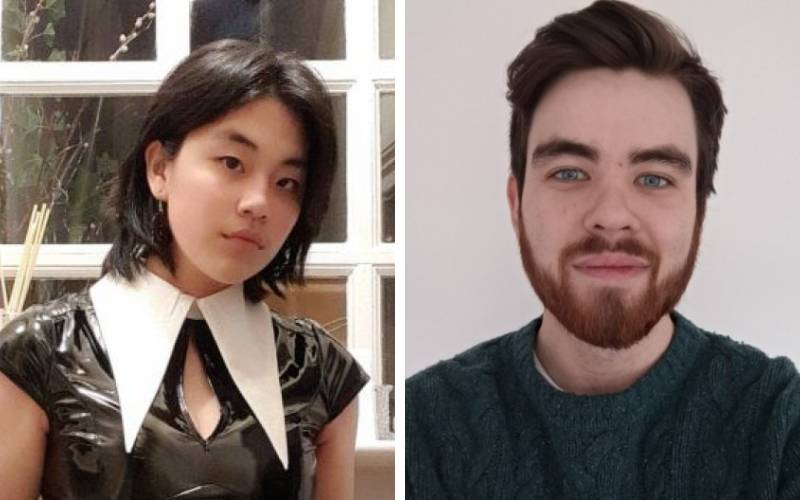
Shining a Light on LGBTQ+ History
Interviews
Hope you’re all having a glorious LGBTQ+ History Month! We’re Grace Wilding and Harry Day, two software engineers from Capgemini, here to discuss all about LGBTQ+ History and why it means so much to us. So, what is this month all about? It is primarily a time to remember the ordeals the LGBTQ+ community has had, as well as those who worked tirelessly to achieve the liberty we have today and educate ourselves on our community’s history. This is especially prevalent as our education currently doesn’t provide enough in terms of LGBTQ+ history.

Grace Wilding (left) and Harry Day (right) are both software engineers at Capgemini. Source: Capgemini
Grace here. I’m hoping things are starting to change, but from experience, LGBTQ+ people aren’t represented or taught enough, and neither is our history. Aside from Alan Turing I struggle to name any notable names from history who are LGBTQ+ that I was taught about at school - there are probably more but if there are, their identities were probably “conveniently” overlooked. Even Stonewall, arguably the biggest in the community’s history, is barely touched upon, especially outside of pride month. A lot of LGBTQ+ history I know I’ve had to learn myself, either through films (such as Pride) or through pure chance on various social media and further research. The community really isn’t represented enough throughout history, and I think it’s why we have this idea that being LGBTQ+ is a “new” thing when it isn't - we’ve always been around, just hidden.
One event that gets overlooked a lot is the destruction and loss of the Hirschfeld institute as a result of the Nazi book burnings. Like a lot of people, I was taught about the Nazis in high school and the book burnings were mentioned, but I never knew about the Hirschfeld Institute until a couple of years ago myself. It set the whole community, especially the trans community, a long way back in terms of providing important LGBTQ+ healthcare such as gender-affirming surgery for trans people.
Named after Magnus Hirschfeld, a gay Jewish sexologist, the Institute for Sexual Research was established in 1919 and performed some of the first gender-affirming surgeries for trans women until its destruction in 1933. At a time where homosexuality was still illegal, not only did Hirschfeld provide sex education and contraception for the community, but he also fought to overturn Paragraph 175, the clause which made homosexuality illegal in Germany, and dedicated his life to liberating the LGBTQ+ community. Alongside his Jewish ancestry, Hirschfeld’s work made him a prime target for the Nazi party, with the destruction of the Hirschfeld Institute becoming one of the first and largest Nazi book burnings, with over 20,000 books being lost to history.
Lili Elbe, the woman who inspired the film The Danish Girl, was even one of his patients, yet his name never even appears in the book that inspired the film, proving that the work and his contributions were effectively erased by Nazi violence. While Stonewall was an important moment in LGBTQ+ History and it’s certainly important to remember it, I think it often (unintentionally) results in people acting as if it was the foundation of the community’s history, continuing the erasure of the work done by the Institute of Sexual Research.
The erasure of LGBTQ+ people from history as a result of colonization is another issue that should be spoken about a lot more, but I think that issue goes deeper than just LGBTQ+ history. This is part of the larger issue of colonialism and its oppression of various cultures - so many cultures worldwide have a history of tolerance and acceptance towards the community, yet it is largely forgotten about, especially in countries like Japan where they now have a reputation for being homophobic and/or transphobic. We need the spotlight to be on more queer Black, brown and/or Asian members of our community throughout history, which is why it is also vital we continue to learn about Stonewall.
Harry here. As we’ve said, so much of LGBTQ+ culture is missed from the current education system, despite most of queer history being filled with core values of stoicism, community, and empowerment. Like Grace, I had little knowledge of those who made up LGBTQ+ history, which is why I want to take this moment to celebrate those who have, by talking about 3 members I wish to shed more light on.
Firstly, we celebrate Bayard Rustin, a civil rights advocate and advisor to Martin Luther King Jr. Rustin was a pivotal member in multiple anti-segregation movements, such as planning the March on Washington (a tool used to pressure the US government into fair work for African Americans) and leading Freedom Riders (a community of Civil Rights activists who would ride interstate buses into segregated areas). This work towards racial equality was challenged by Rustin’s homosexuality, culminating in him being asked to end his association with King following fabricated rumors about their romantic involvement. Despite this, Rustin still pursued the intent of ‘equality for all’, which included both race and sexuality. He saw sexuality as ‘a private matter, one that shouldn’t affect how we are perceived’. This mindset led him to still engage in the struggle for justice, despite tension from other black activists. His resolve on this matter helped push forward the movement of normalizing sexuality, stating “I think the gay community has a moral obligation… to do whatever is possible to encourage more and more gays to come out of the closet.”. A celebration of his groundwork has been showcased by Rustin posthumously receiving the Presidential Medal of Freedom in 2013, USA’s highest civilian award, for his work towards equality for all.
Another major pioneer in the struggle for equality was Marsha P Johnson, being a vocal trans rights activist and queer movement worker in the 1950/60s. Being assigned male at birth, Johnson spent most of her childhood wanting to be more feminine presenting. After graduating high school, Johnson moved to New York and became a prominent character within New York’s Transvestite (now Transgender) community; her welcoming presence within Greenwich village crowned her the "mayor of Christopher Street", being often adorned with a flower wreath. Here she would meet Sylvia Rivera, a young trans Puerto Rican girl, whom Johnson would become a protector for; the pair would continue to become a combined force within the Trans Rights Community.
Despite this positivity, Marsha spent most of her life homeless due to the difficulty of finding stable work. This forced her into the extremely unsafe act of sex work as her primary income, even when she found jobs waiting tables and performing in drag shows with her group ‘Hot Peaches’. From this, Johnson remained a positive force within the Trans community; this was most prominent in her involvement within the Stonewall Riots, where police began raiding the Stonewall Inn in the early hours of June 28, 1969. Like many other trans women, Johnson fought back against the years of fear and oppression. This night led her to become even more active within the gay rights community, attending every rally, sit-in and meeting she could. However, she came to recognize the level of cis-gendered dominance within the community, which led herself to focus specifically on Trans representation and equality. This also pushed her to set up the Street Transvestite Activist Revolutionaries (STAR) to provide safe lodgings for the Trans Community. Like Rustin, Johnson proves to be an incredible example of equality for all, even when similar communities do not value you as such.
One final historical LGBTQ+ rights advocate was Barbara Gittings. Gittings spent most of her early years as a pioneer against the ban on employment of gay individuals in the US government. This led her into several movements, focusing on positively promoting homosexual literature, as well as fighting for the removal of homosexuality being classified as a Mental Illness within America. Furthering this, Gittings’ true force lay within her founding the ‘Daughters of Bilitis’, USA’s first lesbian civil and political rights organization, alongside several notable women such as Del Martin and Phyllis Lyon. Starting out as 8 members, this group slowly grew with the aim to educate members on the current issues within the US government, and act as a safe space to discuss the promotion of changes against them. As well as homosexuality, this organization gave space for the efforts of feminism, another movement so desperately needed during this time. With this, Gitting’s efforts paralleled that of Rustin, and so many others, in that equality was a push for all; race, sexuality, gender: they’re all subject to oppression within our society. This is as prevalent today as it was then, which is why we must remember the foundations of these movements, and those who led them.
These three members have truly shaped how we are able to express ourselves in modern society, however they make up but a drop in comparison to all those who have fought for our freedom. But we must not forget that the efforts towards true equality is an ongoing issue, which the community continues to fight towards; we are continuing to make history, such as in legalizing same-sex marriage and giving freedom to gender identity. Spreading awareness is necessary to ensure these movements continue to push forward, which is why these topics remain as such a prevalent issue to be taught in today’s education systems.

